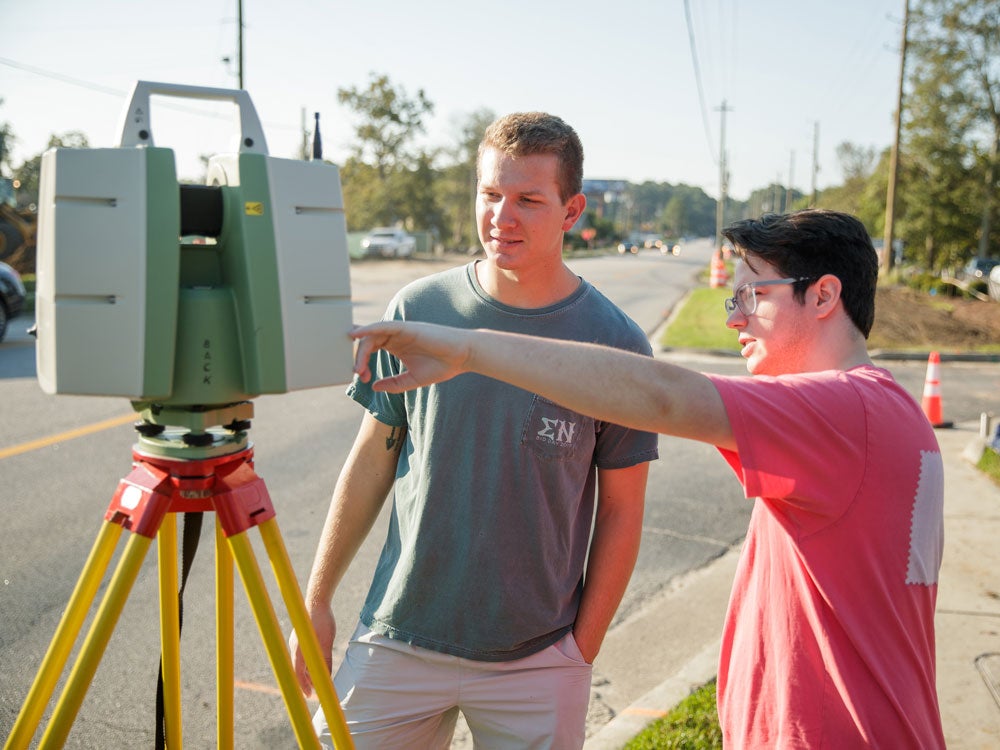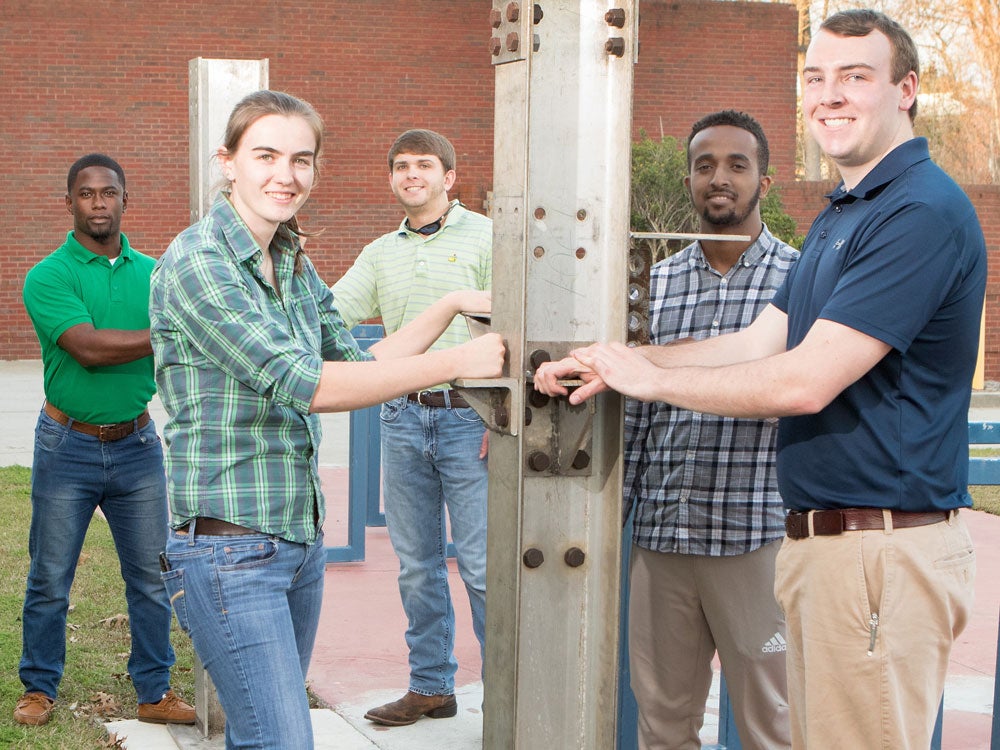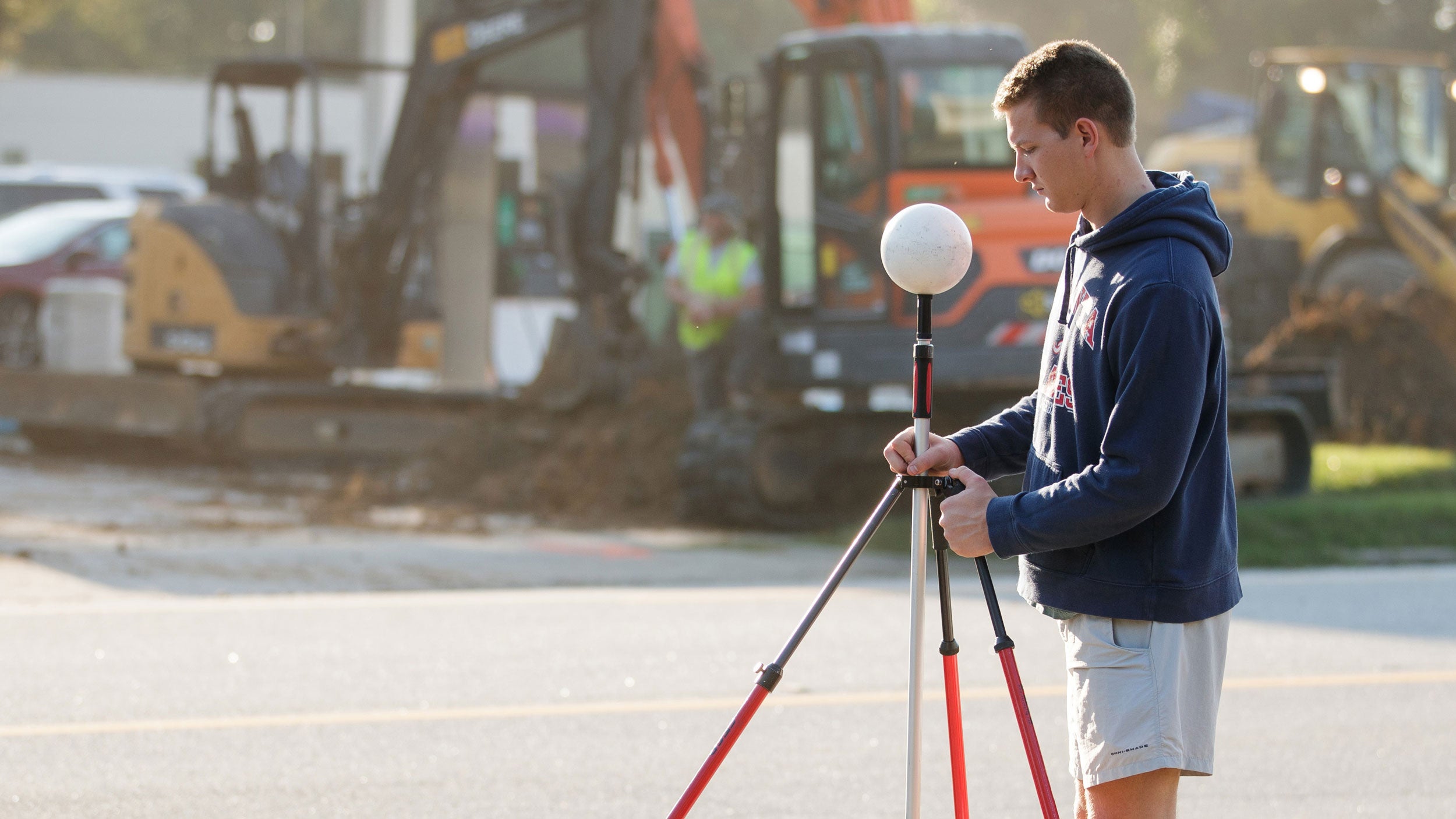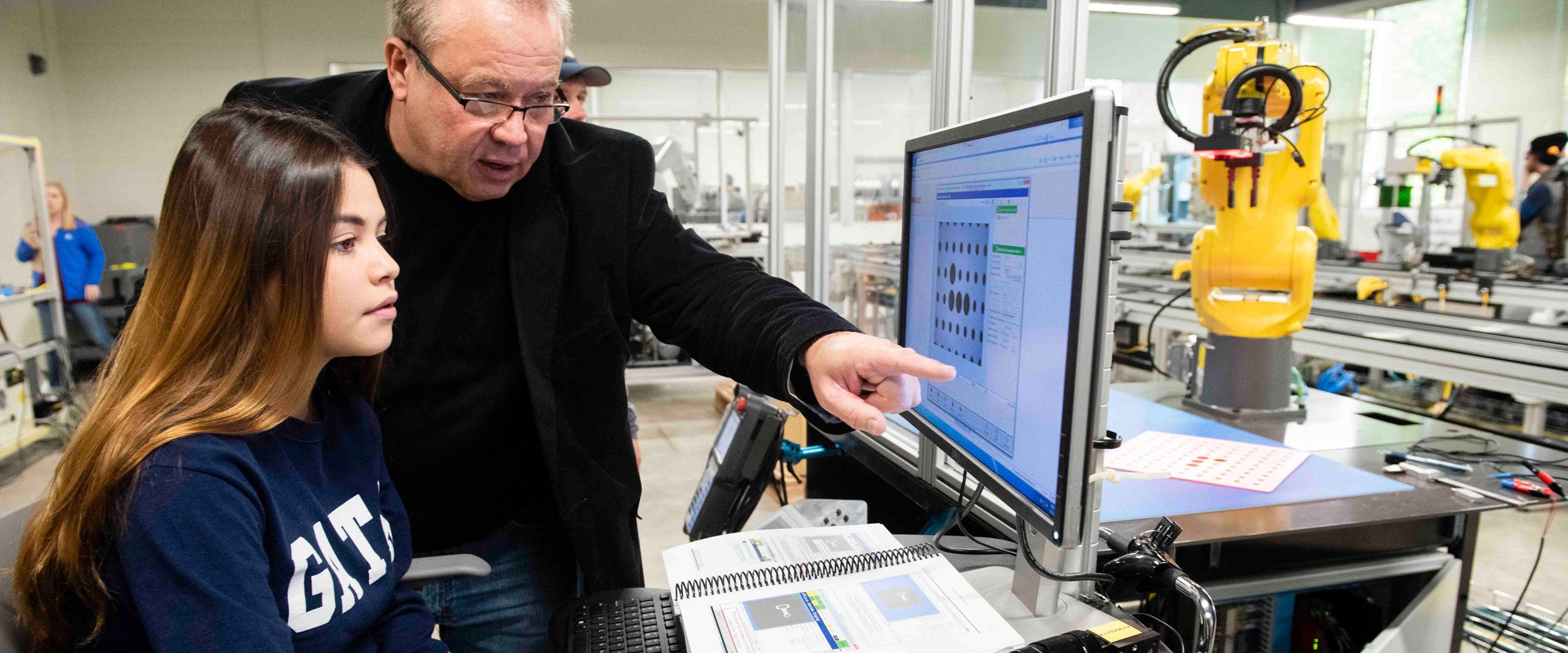Civil engineering is the oldest of all engineering disciplines. But you’ll learn the profession’s latest techniques in Georgia Southern University’s program, where you’ll get an application-driven education under the guidance of skilled faculty. Learn the skills and knowledge you’ll need to plan, design and oversee the construction of facilities and infrastructure that make modern life possible.
Locations
- Statesboro Campus (In Person)
Why Major in Civil Engineering at Georgia Southern?
- ABET-accredited program.
- Earn and learn while you complete a co-op with an area employer.
- Gain hands-on experience in state-of-the-art specialty labs.
- 130 credit hours to completion.
A Bachelor of Science in Civil Engineering from Georgia Southern teaches students how to solve real-world problems while emphasizing the role professionals play in developing a responsible, sustainable future.
Before you head into the field, you’ll explore the theories behind the discipline’s five main areas — water resources/environmental, structural, transportation-pavement/geotechnical, construction and surveying/geomatics — but it’s the focus on applied knowledge that sets a Georgia Southern education apart. You’ll see lessons come to life in 10 specialized labs, including ones devoted to soil mechanics, asphalt research, hydraulics and fluid mechanics and more.
In addition, Georgia Southern civil engineering majors put what they acquire in the classroom to work long before they graduate. You’ll build experience employers demand in internships, co-ops, student research and other hands-on opportunities.
Ready to Apply?
What Can You Do With a Bachelor’s in Civil Engineering?
Graduates of Georgia Southern’s bachelor’s in civil engineering degree program go on to build the projects that power society and keep it moving, including dams, power plants, transportation infrastructure, water supply and wastewater disposal systems and more.
Where our graduates work:
- Booz Allen Hamilton
- CB&I
- CDM Smith
- EMC Engineering Services Inc.
- Georgia Institute of Technology
- Georgia Ports Authority
- Lockheed Martin
- McLendon Enterprises
- Southern Nuclear
- Thomas & Hutton
What our graduates do:
- Civil engineer
- Construction manager
- Design engineer
- Engineering consultant
- Engineering manager*
- Environmental engineer
- Hydrologist
- Land surveyor
- Structural engineer
- Transportation engineer
*Requires additional education
What You’ll Learn
The bachelor’s in civil engineering curriculum provides a comprehensive overview of the profession. In addition to coursework in physics, mechanics and mathematics, classes cover surveying, environmental engineering, water resources and construction concepts.
See the CurriculumBuild Your Experience
Employers know that students who graduate from Georgia Southern’s civil engineering program have the experience necessary to hit the ground running — and so will you.

Internships and Co-ops
Whether you alternate semesters in the classroom with a paid, full-time co-op or complete an internship over the course of a semester, you’ll have the opportunity to earn on-the-job experience before you graduate. Work at approved sites on actual projects while learning from veteran mentors.

Get Involved
As a civil engineering major, talk applications and begin to build your network by joining the Construction Management Guild, Construction Management Association of America (CMAA), National Association of Women in Construction (NAWC), SAMSOG Student Chapter or Sigma Lambda Chi, the construction honor society.

Student Research
Research gives you the opportunity to apply classroom concepts to real-life questions. As an engineering student, you’ll have the chance to gain one-on-one mentorship from committed faculty while working with up-to-the-minute tools in our Engineering and Research Building.
Want to Learn More?
Explore essential information about our BS in Manufacturing Engineering program, including application details, accreditation status, and licensing disclosures. Gain insight into the program’s credibility and requirements to help you start your journey toward success with the knowledge you need.
Follow these steps to complete the Georgia Southern application:
- Create an application account.
- Complete our online application using the PIN you received after creating your application account.
- Once complete, pay the $30 application fee or upload a valid fee waiver. Previous Georgia Southern applicants and dual enrollment students do not need to pay the fee.
You can check your application status at My.GeorgiaSouthern.edu/admissions three days after completing your application. This page contains live information about your admission status, including a checklist of missing documents we need to make a decision.
Apply as a First-Year Student Transfer to Georgia SouthernThe College of Engineering and Computing offers several scholarships meant just for engineering students. Several are designated solely for civil engineering majors, including:
- Stuber-EMC Scholarship
- Robert B. Baker Scholarship
- Hussey, Gay, Bell and DeYoung Civil Engineering Scholarship
- Civil Engineering Materials Laboratory
- Soil Mechanics Laboratory
- Environmental Science Laboratory
- Hydraulics and Fluid Mechanics Laboratory
- Materials Science Laboratory
- Transportation Laboratory
- Built Environment and Modeling Laboratory
- Surveying-Geomatics Laboratory
- Structural Laboratory
- Asphalt Research Laboratory
Students in the civil engineering program can earn a Surveying-Geomatics Certificate by taking a sequence of seven courses, including Intro to Terrestrial LiDAR, Drainage and Erosion Control and Surveying/Advanced Surveying. You’ll gain the skills for assessing landscapes ahead of projects, including GIS/GPS proficiency, traditional terrestrial surveying, data collection and more.
All Surveying-Geomatics PathwaysAs a currently enrolled undergraduate, start earning credit for a master’s degree while still working toward your bachelor’s. Our Accelerated Bachelor’s to Master’s Pathway means you can complete two degrees in less time. In the process, you’ll save money while getting a head start on your career.
To qualify, students must have completed at least 25 credit hours of undergraduate civil engineering coursework (including MATH 1441, MATH 2242, PHYS 2211K,PHYS 2212K and CENG 1133) and have a 3.0 cumulative grade point average or higher for all undergraduate coursework.
About Accelerated Pathways at Georgia Southern
The BSCE degree is accredited by the Engineering Accreditation Commission of ABET, https://www.abet.org/.
Graduation Requirements
A total of 130 semester hours are required to satisfy general and professional requirements (see curriculum for details). Professional Registration: In Georgia and other states in the U.S., the BS in Civil Engineering degree and the appropriate number of years of experience plus passing two eight-hour examinations, the Fundamentals of Engineering exam and the Principles and Practice of Engineering exam, qualify a graduate to become a licensed Professional Engineer (PE). The FE exam can be taken during a student’s senior year while enrolled in the civil engineering program and is required for graduation.
- The requirements of the core curriculum and the CE program must be satisfied.
- A minimum of 130 hours is required for graduation.
- At least 30 semester hours of approved civil engineering courses must be taken at Georgia Southern University.
- The total institution cumulative GPA of all courses applied to the degree must be 2.0.
- FE Exam
- Community Service hours
Program Educational Objectives
- Successful Career: Graduates of the Civil Engineering program at Georgia Southern University will be successfully employed in civil engineering or a closely related field.
- Professional Development: Graduates of the Civil Engineering program at Georgia Southern University will exhibit the commitment for pursuit of professional development through activities such as attaining professional licensure, actively participating in professional societies and/or pursuing advanced studies.
- Effective Communication and Teamwork: Graduates of the Civil Engineering program at Georgia Southern University will demonstrate the ability to effectively explain and justify their engineering solutions to a range of audiences, as well as work in multidisciplinary teams with an appreciation of diverse perspectives.
Program Student Outcomes
Students completing the Civil Engineering program will be able to demonstrate the following outcomes:
- an ability to acquire and apply new knowledge as needed, using appropriate learning strategies.
- an ability to identify, formulate and solve complex engineering problems by applying principles of engineering, science and mathematics.
- an ability to apply engineering design to produce solutions that meet specified needs with consideration of public health, safety and welfare, as well as global, cultural, social, environmental and economic factors.
- an ability to communicate effectively with a range of audiences.
- an ability to recognize ethical and professional responsibilities in engineering situations and make informed judgments, which must consider the impact of engineering solutions in global, economic, environmental and societal contexts.
- an ability to function effectively on a team whose members together provide leadership, create a collaborative and inclusive environment, establish goals, plan tasks and meet objectives.
- an ability to develop and conduct appropriate experimentation, analyze and interpret data and use engineering judgment to draw conclusions.
Completion of Georgia Southern’s Bachelor of Science programs in Civil Engineering, Construction Engineering, Mechanical Engineering, Electrical Engineering and Manufacturing Engineering meet the educational requirements to begin the licensure process in the 50 U.S. states, the District of Columbia and five U.S. territories (American Samoa, Guam, Northern Mariana Islands, Puerto Rico and the Virgin Islands) by providing the coursework necessary to sit for the Fundamentals of Engineering Examination. Software Engineering does not have a specific PE examination. It is typically recommended that candidates sit for their FE exam toward the end of their senior year, or soon after graduation. Visit the National Council of Examiners for Engineering and Surveying for more information.
Georgia Southern makes every effort to ensure information about educational requirements for licensure or certification is current; however, state requirements may change. Separate from educational requirements, state licensure boards may require applicants to complete professional examinations, background checks, years of professional experience, residence requirements, jurisprudence exams, training, etc. If you are planning to pursue professional licensure or certification in a state other than Georgia, it is strongly recommended that you contact the appropriate licensing entity in that state to seek information regarding licensure or certification before beginning an academic program. For more information and a list of applicable state boards, visit the Georgia Southern State Authorization and Professional Licensure page.
Alumni Feature
As Myla Kelly looks back on her college career, it’s evident that the support she received helped propel her to a job offer with Georgia Southern and acceptance to graduate school before she earned her degree. And it’s why, as an alum, she’s trying to set that same example.
Read Myla's Story
Faculty Feature
On construction sites, crystalline silica is one of the biggest threats to health and safety. Saman Hedjazi, an assistant professor of civil engineering and construction management, recently participated in a project led by the Jiann-Ping Hsu College of Public Health to test new, wearable filters that can protect workers against this airborne peril.
See Our Research in Action
Accreditation
The Bachelor of Science in Civil Engineering program is accredited by the Engineering Accreditation Commission of ABET, https://www.abet.org, under the commission’s General Criteria and Program Criteria for Civil and Similarly Named Engineering Programs.

Take the Next Step
Civil engineers build the infrastructure that keeps society moving forward. Ask us how Georgia Southern can help you build your own future with a BS in Civil Engineering.
Contact Us
Department of Civil Engineering and Construction
Georgia Southern University
P.O. Box 8077
Statesboro, GA 30460
Phone: 912-478-1894
Fax: 912-478-1885
Email: cecm@georgiasouthern.edu
Physical Address
Engineering Building, Rm. 1120A
201 COBA Drive, BLDG 232
Statesboro, GA 30458





